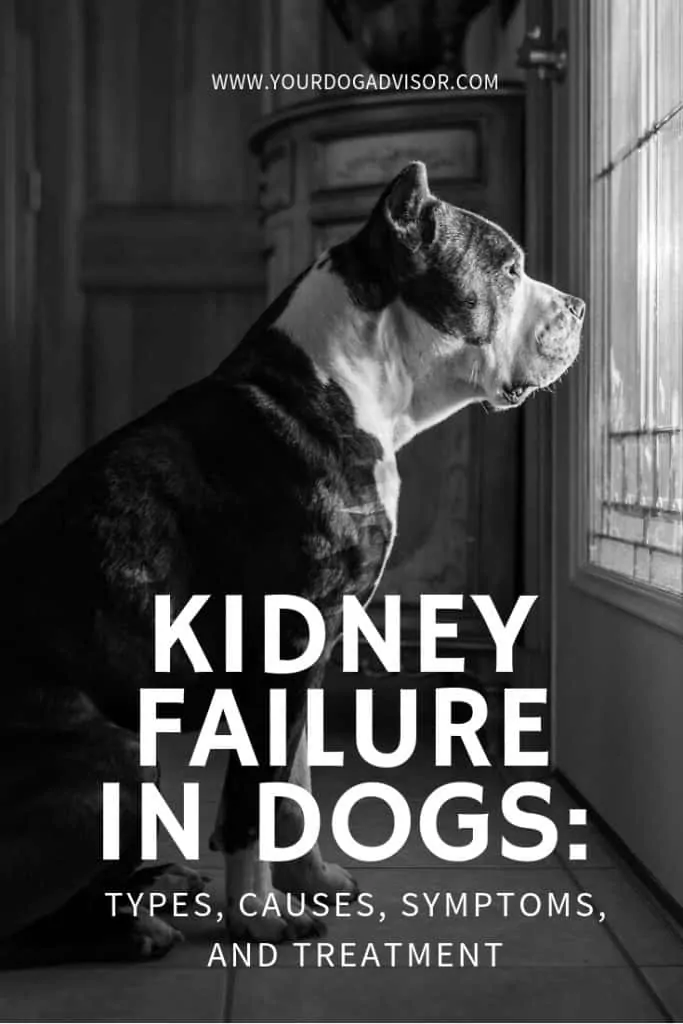Did you find out that your canine companion is suffering from kidney failure?
As a dog ages, kidney failure becomes more prevalent. Like humans, a dog’s kidneys maintain an average concentration of salt and water in his body. They balance substances in the dog’s blood and filters body waste as urine.
Dog kidneys also aid in calcium metabolism, help control blood pressure, sustains phosphorus levels and also manufacture a hormone that helps red-blood-cell production.
It can be tough to learn that your canine companion could be suffering from kidney failure, but there is hope.
Hence, when your dog’s kidneys fail, toxins will build up in his blood, causing him to become ill.
If your dog is advanced in age, then you know that despite all your efforts to give him the safest and best living conditions, he is no longer safe from anything.
In this article, we share practical info about kidney failure in dogs, the causes, symptoms, and especially the treatments that will help improve or moderate his condition.
Toxins build up in your dog’s blood when he has kidney failure which makes him ill.
Contents
Two Types of Kidney Failures in Dogs
Chronic Kidney Failure
Chronic kidney failure in pooches occurs as a result of a slow and insidious process over the course of a month and sometimes even years.
It develops slowly and commonly affects older dogs. It is often as a result of hereditary and congenital conditions or an underlying illness. Surprisingly, the leading cause of this condition is dental disease.
When bacteria that causes advanced dental disease enters the dog’s bloodstream, it invades multiple organs, which then causes irreversible damage to the kidneys, liver, and heart.
Because the symptoms of chronic kidney failure don’t show in the beginning, when your dog is diagnosed with this, his kidneys are already no longer working right. For this reason, chronic kidney failure in canines is irreversible
However, there are still many solutions that will help you extend your mutt’s life quality and expectancy. Hence, do not panic if your canine companion has been diagnosed with chronic kidney failure.
Acute Kidney Failure
Compared to chronic kidney failure, acute kidney failure occurs suddenly. This could also include acute kidney damage.
Acute kidney failure could be related to urinary obstruction, severe dehydration, bacterial infection, or ingestion of toxic substances, including certain medications, antifreeze, tainted foods, etc.
If acted upon quickly, this condition can be treated. The symptoms of acute kidney failure can be so blatant, making it impossible for you to miss them.
If not treated quickly enough or if the damage is too significant, your dog’s kidneys will be damaged in the long term.
Acute kidney failure is treatable when diagnosed early.
What Causes Kidney Failure in Dogs?
As mentioned earlier, several factors can ultimately contribute to kidney failure in canine companions. However, some circumstances primarily result in kidney failure that can be prevented.
Understanding these causes will help you ensure that you take the best steps to avoid any harm to your pooch’s vital organs.
Diet
The importance of diet when it comes to dogs cannot be stressed enough. What you feed your dog could affect the quality of his life in more ways than you can imagine.
Diet also comes into play when it comes to your dog’s kidneys. You must make sure you feed your four-legged friend with the best diet with vet supervision.
Avoid dog foods that are high in phosphorus or have increased levels of protein because they tend to increase kidney failure progression.
Age
Countless studies show that kidney diseases are mostly correlated with age. In fact, after seven years, the possibility of dogs having kidney issues is high.
Environmental toxins ultimately affects the type of kidney failure your dog suffers from.
Environment
How environmental toxins affect a dog ultimately dictates the type of kidney failure they get. These toxins can be directly linked to both acute and chronic kidney failures.
These toxins include household cleaners like disinfectants and antifreeze, herbicides, pesticides, lead paint, and some human medications.
If you regularly expose your dog environmental toxins like mold, chronic kidney damage can result after an extended period.
Breed Predisposition
Some dog breeds are at a larger predisposition for developing kidney problems. They include:
- Bull Terriers
- German Shepherds
- English Cocker Spaniels
- Samoyed
- Cairn Terrier
However, if you aren’t a dog parent to one of these breeds, it doesn’t mean that your canine companion is not at risk of getting this condition.
To always be on the safe side, it is crucial for dog owners to be aware of their dog’s genetics and any diseases associated with this.
It is important for you to be aware of your dog genetics and some of the diseases he could potentially be susceptible to.
Dental Disease
This is the most common cause of chronic kidney failure. As aforementioned, when the bacteria in your puppy’s mouth, causing the dental condition moves to his vital organs, his kidneys, heart, and liver to become affected.
Additional Causes
- Stress
- Shock
- Infection
- Blood loss
- Blood clots
- Untreated diseases
- Dehydration
- Congestive heart failure
- Kidney stones
- High blood failure
Kidney Failure Symptoms
Unfortunately, it can be challenging to recognize kidney failure in its early stages. Most pet parents start to notice that their pup is drinking more water than usual.
The on-set of this is because the dog’s kidneys are not able to work on their own because of toxicity build-up.
After the excessive water intake in your dog begins, accumulation of toxins becomes so much that even tanks of water can’t resolve the dog’s thirst.
General symptoms of kidney failure in dogs:
- Increased thirst
- Increased urine production
- Weight loss
- Decreased appetite
- Vomiting and diarrhea
- Bad breath
- Depression
- Sore mouth
- Lack of energy
- Increased sleeping
- Weakness
- Poor coat appearance
- Pale gums
- Blood in urine
- Stumbling, acting drunk
- Hunched posture
- Convulsions
- Retinal detachments
Increased sleeping could be a sign of kidney failure. Once you notice this, have your vet check your dog out.
Symptoms of chronic kidney failure that a health professional can identify:
- Dehydration
- Hypertension
- Anemia
- Endocrine disorders
- Change in kidney size
Measures You Can Take to Prevent Kidney Failure in Dogs
We can’t fight against congenital and hereditary malformations in the case of chronic kidney failure, but you can prevent acute kidney failure.
The most crucial prevention tip, in this case, is taking your dog for routine check-ups. Combined with regular check-ups with your vet, have your vet recommend a diet that will help maintain your dog’s healthy weight.
Your vet should be able to find a diet that allows your dog to consume fresh foods. Find a natural medicine vet who will recommend dietary supplements that will improve his quality of life.
Do not leave dangerous things like rat poison, drugs, onion, garlic, pesticides, plants, heavy metals, antifreeze, etc. near your dog.
Always have a bowl of water out for your dog to keep him well-hydrated. During walks and travel, always carry him a bottle of water.
Get your pup all the necessary vaccinations, medications, and surgical procedures as your veterinarian recommend. It also helps to give priority to all-natural treatments.
To ensure a good prognosis, follow your vet’s recommendations to the letter.
Diagnosis of Kidney Failure in Dogs
Before a dog is diagnosed with kidney failure, the vet has to do a complete blood profile. The blood profile includes a total blood count, a chemical blood profile, and a urinalysis, combined with blood pressure testing.
Blood tests enable the vet to measure the measure of toxins produced by your dog’s body that are usually eliminated by kidneys such as creatinine and urea.
The creatinine and urea levels will be high if his kidneys are not working. The vet may use SDMA, a biomarker that allows early detection of any changes in your dog’s liver function.
Based on the symptoms, the dog may also under tests for detection of any infectious diseases that tend to affect the kidneys such as Lyme disease or a chemistry profile with electrolytes.
X-ray or ultrasound may also be performed to observe the shape and size of his kidneys. This will allow the vet to detect any visibly noticeable abnormalities. If your dog has chronic kidney failure, his kidneys become abnormally small.
An X-ray will also reveal the size of his bladder and prostate, which are also closely related to the functioning of the kidneys.
We tend to worry about our pets when they have to undergo tests, but these examinations cause no pain, and they are instrumental, and so you have nothing to worry about.
A successful prognosis is dependent on ensuring that your dog undergoes numerous examinations to get a reliable diagnosis.
The treatment of your dog’s kidney failure highly depends on the stage your dog is at.
Treatment
There is no treatment for chronic kidney failure.
The treatment depends on the stage your dog is at. When it’s chronic, the destruction of your dog’s kidneys is often progressive, and unfortunately, the kidneys are already in a lousy state at this stage.
Here are solutions that will help with the treatment:
A Prescription Diet
To manage kidney failure, your vet may recommend a prescription diet that restricts phosphorus and sodium. The diet will instead have a higher level of polyunsaturated fatty acids (omega-3 and omega-6 fatty acids), which are beneficial for his kidneys.
The problem is, your dog may refuse to eat these foods because they are not as flavorful. Consult your vet if your pooch is resistant to the diet. The veterinarian will add medications to manage the symptoms further and make him willing to eat.
The vet may recommend small amounts of chicken stock, tuna juice, or other flavor enhancers to help your dog’s interest in the food. Do not counteract the prescription diet by adding the wrong dog food toppings to make it bearable for your dog.
Fluid Therapy
Dogs with long-term kidney failure have depleted body fluids levels, which means that they continuously experience dehydration. Fluid therapy may be recommended to assist with dehydration.
Maintaining your dog’s hydration is critical, and so you always need to make sure that he has adequate clean water to drink. If diagnosed with dehydration, your vet may give him supplemental fluids subcutaneously (under the skin) or intravenously.
Phosphorus Binders and Vitamin D Supplements
Dogs with chronic renal failure will benefit from phosphorus binders and vitamin D supplements because it helps improve phosphorus and calcium balance. They also help reduce some of the secondary effects of renal failure.
Other Medications
- H-2 Receptor Blockers -This will help treat secondary gastritis and gastric ulcers that develop. They can also help improve your dog’s appetite.
- Enalapril- a natural blood pressure elevator that also blocks angiotensin
- Antihypertensives- to decrease blood pressure
- Erythropoietin- stimulates the production of red blood cells hence increasing oxygen in the dog’s tissues
Other Possible Treatments
Your vet may also suggest:
- Medicines to fight diarrhea and vomiting
- Infusions that will support the dog’s body and eliminate any toxins accumulated in his blood
- Antibiotics in case he has any infections
- Diuretics to help increase urinary secretions
Natural Treatments
With your holistic vet’s supervision, you can use natural remedies to alleviate some of the symptoms. Some plants like desmodium, orthosiphon, dandelion, ginkgo, and milk thistle can be very beneficial for kidneys, blood circulation, liver, or bladder.
The piloselle also has antiseptic and diuretic properties that can be very effective if your dog has a urinary tract infection.
Some Chinese herbs will also help with increased blood flow to your dog’s kidneys, which will help him eliminate toxins from his bloodstream.
However, make sure you consult a Chinese medicine professional and have them recommend the best Chinese medicines and herbs for your dog.
If the diagnosis is made sooner, you may prolong your dog’s life expectancy.
What’s The Prognosis?
Unfortunately, there is no cure if your dog is diagnosed with chronic kidney failure. However, if the diagnosis was made sooner, you may be able to make his life expectancy longer.
Some treatments will help reduce the symptoms for dogs with chronic kidney failure, slow down the effects of the condition, and allow your dog to live better even with the disease.
If your dog’s kidney failure is as a result of suffering from another disease that’s causing obstruction to his urinary tract or reducing blood flow to his kidneys, then it can be treated. However, you need to make sure to get consultation early.
If he has acute kidney disease, treatments like liquid therapy, antibiotics, or other medications will help return creatinine and urea to normal, and your dog could be out of danger. If not, he will be monitored closely because his kidneys have become weakened.
Conclusion
Being a doting dog parent, may not be a walk in the park but we love our canine companions anyway. It can be a heart-wrenching and incredibly frustrating if your pooch is diagnosed with kidney failure.
The good news is, you have many more options when it comes to managing and treating kidney failure in dogs. Given the right advances in drugs and nutrition, the longevity of your canine companion will be on the rise. With your vet’s assistance, you have a chance to give your pup a long life regardless of the kidney problems.

Jen Jones is a professional dog trainer and behavior specialist with more than 25 years of experience. As the founder of ‘Your Dog Advisor’ and the ‘Canine Connection’ rehabilitation center, she applies a holistic, empathetic approach, aiming to address root causes rather than merely treating symptoms.
Well known for her intuitive and compassionate approach, Jen adopts scientifically-proven, reward-based methods, encouraging positive reinforcement over punishment. Jen specializes in obedience training, behavior modification, and puppy socialization. Her innovative methods, particularly in addressing anxiety and aggression issues, have been widely recognized. Jen has worked with many of the world’s leading dog behaviorists and in her free time volunteers with local animal shelters and rescue groups.









